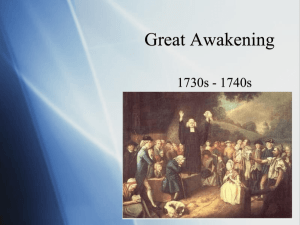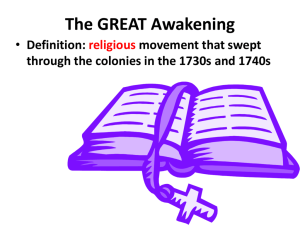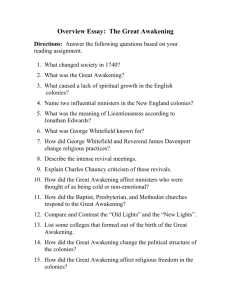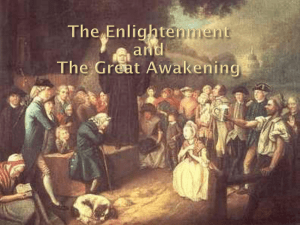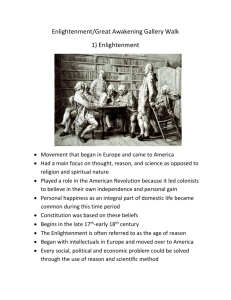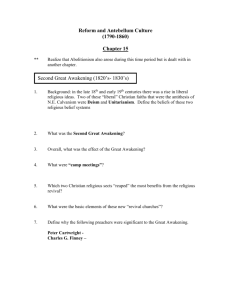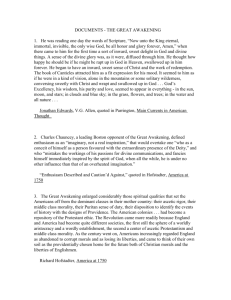Great Awakening - Mrs. Hopkins History Class
advertisement
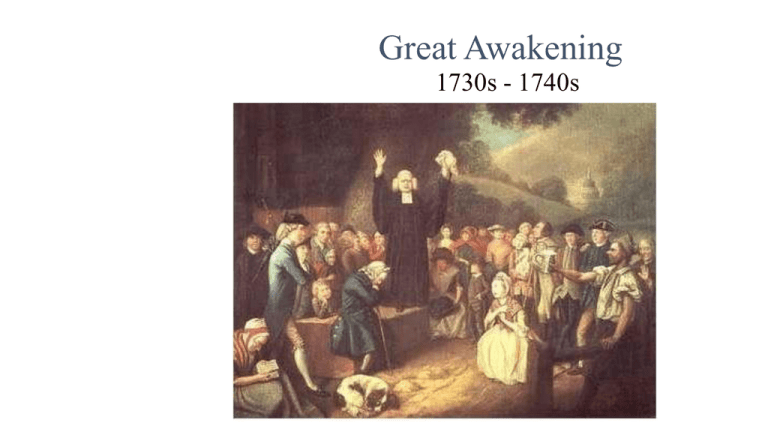
Great Awakening 1730s - 1740s What was the Great Awakening? ▪ Religious revival movement. ▪ Evangelicalism-- “new birth” is the ultimate religious experience. ▪ Followers accept that they are sinners and ask for salvation. Before the Great Awakening ▪ Before 1730s, most colonies had established religions: ▪ Congregationalists in New England (basically Puritans) ▪ Anglicans in New York and Southern Colonies (same as Church of England) “Old Lights” vs. “New Lights” ▪ Churches that grew as a result of the Great Awakening: Presbyterianism, Methodism, Baptism (“New Lights”) ▪ Great Awakening challenged authority and hierarchy of established churches (“Old Lights:” Congregationalists and Anglicans). ▪ Great Awakening said anyone could be converted or “born again”; you didn’t need traditional church leadership to decide whether or not you belong. Great Awakening contin. ▪ Encouraged ideas of equality and the right to challenge authority ▪ Some churches welcomed women, African Americans, and native Americans ▪ Churched rapidly gained membership Leaders of the Great Awakening George Whitefield Jonathan Edwards ▪ Both were famous ministers ▪ Whitefield: raised $ for orphans ▪ Edwards: terrified listeners with images of God’s anger but promised they could be saved TEKS 8.3C: describe how religion and virtue contributed to the growth of representative government in the American colonies. TEKS 8.25B: describe religious motivation for immigration and influence on social movements, including the impact of the first and second Great Awakenings TEKS 8.20A: explain the role of significant individuals such as Thomas Hooker, Charles de Montesquieu, John Locke, William Blackstone, and William Penn in the development of selfgovernment in colonial America The Great Awakening The Great Awakening The term Great Awakening is used to refer to a period of religious revival in the 1730s and 1740s in American religious history. It was characterized by widespread revivals led by evangelical Protestant ministers, a sharp increase of interest in religion, a jump in evangelical church membership, and the formation of new religious movements and denominations. Concepts: ⬜ ⬜ ⬜ ⬜ ⬜ Religion should be deeply personal All are sinners in need of God’s redemption (to be saved) Encouraged people to inspect their lives and make a commitment to change Wanted people to connect emotionally to their religion Preached Christianity to slaves
